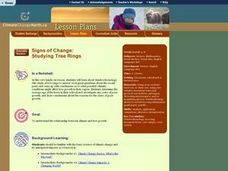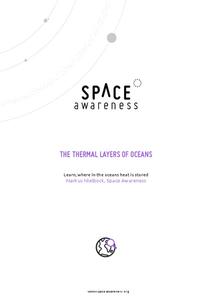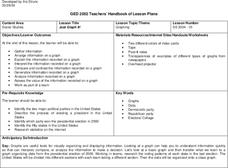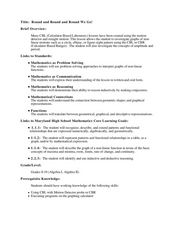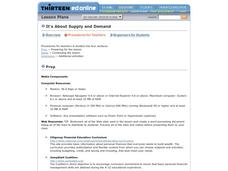Curated OER
Signs of Change: Tree Rings
Students identify and experiment with dendrochronology (the study of tree rings to answer ecological questions about the recent past) and come up with conclusions as to what possible climatic conditions might affect tree growth in their...
Curated OER
Introduction to Flight: A Math, Science and Technology Integrated Project
Seventh graders review graphing procedures and practice locating points using x,y coordinates. Students calculate the areas of the top and bottom surfaces of the airfoil. They construct a test model of the airfoil.
Curated OER
Appearances Are Deceiving
Young scientists study creeks around their area to see how clean the water really is. One way to tell is by the invertebrate populations that are present. This lesson introduces a game which learners simulate a variety of species found...
Howard Hughes Medical Institute
Color Variation over Time in Rock Pocket Mouse Populations
A species-specific look at natural selection, the resource herein examines how adaptations have helped the population of rock pocket mice survive in a changing landscape. To begin, middle or high schoolers watch a 10.5 minute video,...
Curated OER
Keep Away
Study biological diversity by analyzing given data, and make inferences about the possible effects of oil drilling operations on specific benthic communities. This lesson allows students to use their statistical analysis skills asweel as...
National Center for Case Study Teaching in Science
Identical Twins, Identical Fates?
Can different personal experiences affect our genes? Find out in an intriguing case study about one twin who is diagnosed with mental illness and her identical twin who fears she may suffer the same fate. Designed for college-level...
Utah Education Network (UEN)
Subtracting Integers
Review the concepts of additive inverses and adding positive and negative integers. Relate understanding to the subtraction of integers. This is done with either the use of "Algeblocks" (any square or tile manipulative should do) or a...
Earth Watch Institute
Entering Local Groundhog Data in an Excel Spreadsheet
Here is a cross-curricular ecology and technology instructional activity; your learners create spreadsheets depicting the location and number of groundhog dens in a local park. They research groundhogs and analyze data about where the...
Physics Classroom
From a Feather to an Elephant
It is always a rush to drop objects from great heights, and with this physics experiment, class members will not be disappointed! They drop a single coffee filter from a balcony or table top, record the time it takes to reach the ground,...
Curated OER
Where is Shirley the Elephant?
Young animal lovers engage in a lesson that's all about elephants. They access an elephant sanctuary website and read a story about Shirley the elephant. They perform a series of activities based upon that story, and also study about the...
EngageNY
Proving Trigonometric Identities
Young mathematicians first learn the basics of proving trigonometric identities. They then practice this skill on several examples.
PHET
Radiation Hazards in Space
Young scientists race from Earth to Mars and back, trying to complete mission objectives while avoiding radiation in this game for 2-4 players. To identify the winner, players must graph their mission points and radiation points at the...
Space Awareness
The Thermal Layers of Oceans
How much does the sun heat up a lake or ocean? Scholars use a cup and a strong lamp to investigate the heat transfer and thermal layers in the ocean to come up with the answer. They collect data and graph it in order to better understand...
Curated OER
No Title
Sixth graders, after reviewing and studying the basics of recording, analyzing and presenting data, create on graph paper a bar or line graph to represent given data and then interpret the data. They answer questions about the given data...
Curated OER
Just Graph It!
Students research presidential election voting results, and organize and interpret data on class graphs.
Curated OER
Hurricanes in History:
Students interpret data displayed in a graph, make inferences based on graphical data. They work in pairs or groups to interpret graphs containing historical data of hurricanes, and then answer questions that assess their understanding...
Curated OER
Graph Around the Room
Students discuss the importance of taking care of their bodies. They brainstorm ways to take care of their bodies. They create a graph.
Curated OER
Math & Social Science
Students are given data and are to calculate averages and yearly totals of how many cars travel the Tacoma Narrows Bridge. They also make a graph of the data.
Curated OER
When Am I Ever Going to Use this?
Young scholars solve problems using equations and properties of integers. In this algebra lesson, students solve problems using ratio and proportion and graph their answers on a coordinate plane. They solve word problems using geometry.
Curated OER
Round and Round and Round We Go!
Students investigate motion using a CBL. In this algebra instructional activity, students collect and graph data on a coordinate plane. They define and identify amplitude and period of conic graphs.
Curated OER
What's The Weather?
Second graders record and summarize daily weather observations for a week in the form of a bar graph. They cut and glue a weather symbol for each day, record it on the graph, and answer discussion questions.
Curated OER
Decode Word Is..
Students solve problems using patterns. In this algebra activity, students identify the relation, domain and range of a function. They graph functions using coordinate pairs.
Curated OER
How Many Cells Are Born in a Day?
Students predict the number of cells after a series of cell divisions. For this cells lesson students create a graph of their results and create a patterned drawing.
Curated OER
IT IS ABOUT SUPPLY AND DEMAND.
Students learn that the price of an item is defined by its supply and demand. In this lesson students graph the relationship between demand and supply of various products, students also consider hidden costs.


